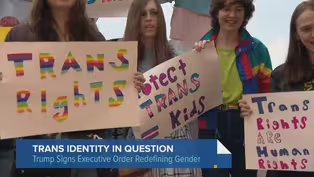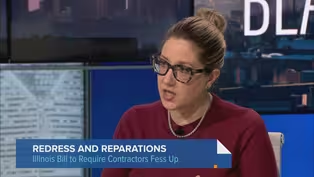Chicago Tonight: Black Voices
New Book Explores Personal Stories on Segregation in Chicago
Clip: 1/29/2025 | 7m 31sVideo has Closed Captions
Have you been told to avoid the South and West sides? A book explores the impact of that message.
Have you been told to stay away from the South or West sides of Chicago? That was the question posed to Chicagoans, and responses poured in about times they were told "Don't Go."
Problems playing video? | Closed Captioning Feedback
Problems playing video? | Closed Captioning Feedback
Chicago Tonight: Black Voices is a local public television program presented by WTTW
Chicago Tonight: Black Voices
New Book Explores Personal Stories on Segregation in Chicago
Clip: 1/29/2025 | 7m 31sVideo has Closed Captions
Have you been told to stay away from the South or West sides of Chicago? That was the question posed to Chicagoans, and responses poured in about times they were told "Don't Go."
Problems playing video? | Closed Captioning Feedback
How to Watch Chicago Tonight: Black Voices
Chicago Tonight: Black Voices is available to stream on pbs.org and the free PBS App, available on iPhone, Apple TV, Android TV, Android smartphones, Amazon Fire TV, Amazon Fire Tablet, Roku, Samsung Smart TV, and Vizio.
Providing Support for PBS.org
Learn Moreabout PBS online sponsorshipstay away from the south or west sides of Chicago?
That was the question posed to local residents and responses poured in about times.
They were told don't go those start.
Stories are now compiled in a new book called Don't Go Stories of Segregation and how to disrupt it to better understand what can happen when people explore the ignored parts of the city.
Joining us now are the book's co-authors artist photographer Tamika Lewis.
Johnson.
And so she ala just Maria Kreis.
And thanks to you both for joining us.
Welcome back to Chicago tonight.
so this book starts with your own personal stories of growing up and then how you came together to write this book.
How does your story reflect the experiences of the people that you included Maria President, start with you.
>> Some not very much.
I think that's part of the interesting part of the story between 20 We had extremely different upbringings.
I grew up in a small town in South Dakota where there were 3 black people.
So we did not have the kinds of issues of segregation in small town.
So my upbringing with very different continue cause.
And that's kind of part of the point of the inclusion of the stories is that 2 people with very different backgrounds, but having very similar.
Other experiences.
We both love to read.
We both had family with artists.
you know, we had lots of similarities.
you are going to say and UK.
Same question to you.
How do you think it's important or what think is important?
>> To include that your own stories in this story.
>> Or I wanted, people who read this book to understand that this is what segregation and prevents you from being able to do it.
Keeps you from people that you have a shared passion with.
>> That you have common interests with.
And when you come together, you can create a book like Don't Go in.
So it was really important for people to understand that even though Murray and I have very different backgrounds, we have a shared passion and interest to help educate people on how to disrupt segregation.
And this was our way of demonstrating that.
So that's an example of what can happen when you disrupt segregation.
When you ask people to share their don't go stories.
Of course, he received a lot of responses.
Maria, what does that tell you?
>> That Tunica once again really struck a chord.
I tell people I'm a sociologist tonight for years have tried to get people to talk to me to do surveys and interviews and focus groups that I have to bribe them and control them and persuade them do So when I open the inbox that showed all of the responses that Tony Cuphead generated just by mentioning it on social media.
I was like, OK, well, this is a lot easier than anything I've ever done.
And it was the stories were amazing.
It's yeah.
Speaks to her following as Tenikka what's wrong with the don't go narrative when people don't go into that neighborhood was one with that.
>> especially when you're in a segregated city like Chicago people say don't go to the south side of Chicago and the south side of Chicago is majority black because of our history.
>> A red line E and when people say that it shows that they're not educated on how that came to be and how it perpetuates segregation.
So it's just a common rumor.
And businesses know that people who are interested in buying homes know that.
So you're literally stifling black neighborhoods by just saying something, just so calm and I don't go to the South side because it really does prevent investment.
It's also offensive to the thousands and thousands of people who call those neighborhoods home.
>> Personally offensive.
And that's the other part that I think we really wanted to show.
His book is the personal part of segregation.
It's not just that prevents economic investment.
It hurts people's feelings and it helps people leave fear.
And we wanted to offer an opportunity for people to understand how to disrupt that and how to not be offended offensive to people.
>> Maria, what are some of the themes that emerged from these stories?
>> So many I have through mayor.
Here was the predominant theme and it was fear of.
Being shot and killed.
You know, that's what we heard from many weight people that we talked to talked about, the message that they were got, that they were received either growing up from their parents or families or police officers sometimes or coworkers or colleagues or college student friends, things like that.
Everyone is.
Instilling the sphere.
So that was really that's kind of the motif that goes through all of it.
It's also fear being embarrassed to talk about these kind of things.
I think that's part of why we really wanted to do this book is to show people you can confront these fears the thought since and fears that you have our shared by others and people can see themselves in the book and say, oh, now I see they overcame their fears and did something and wants conquer that fear and maybe they do go to visit a neighborhood on the south or the West side.
What they learn.
That's beautiful part that I love about the book.
>> Is that this book in particular since we have a stories of white Chicagoans, black, Chicagoans, Latino Chicagoans.
It really does help people understand how segregation segregation impacts all of us and the fear that we're talking you know, a lot of white Chicagoans expressing the vulnerability of admitting they have been taught to be raised in that fear.
And so one of the revelations that they have is not what I've been taught and it is actually racist.
And then also we have people who are from neighborhoods that people are told to not go to it on a and her story is very much like mine.
She had to learn that that's what people thought of her neighborhood.
And that was eye-opening for her.
>> Why is this kind of storytelling important?
How does storytelling help disrupt segregation?
I think that as a sociologist who spent her career.
Crunching numbers analyzing tax reducing them to reports that academics and policymakers read.
I think the story is touch us in a way that tanika always talks about until we make segregation person.
All we're never going to break it down.
And I think what better way then through stories too.
Help people see that really what's going on the impact of of the messaging.
I just think stories are related.
Bill.
It seems to me to make it also sort people taking it into their own hands rather than waiting on.
>> Government to fix segregation.
Oh, yes, because politics and policies haven't gotten us to where we want to be.
And I personally believe.
>> Is because we forget that it's personal.
Racism is rooted in people to people and it's really personal.
And that's the part that we want to elevate and bring back good.
You can disrupt these large systemic issues by, you know, changing behaviors.
Your personal behaviors are just thinking about the history of all of these issues.
And really is how you treat people.
It just comes down to that.
>> All right.
Lessons to be learned.
Sounds like a good book to get to to get our hands on that.
That is what we'll have to leave it.
My thanks to Tamika Lewis Johnson and Maria crease in for joining us.
Thank Congratulations on the book.
Advocates Push Back on Trump's Order Scaling Back Transgender Protections
Video has Closed Captions
Clip: 1/29/2025 | 9m 19s | President Donald Trump's executive order is likely to be challenged in court. (9m 19s)
Proposal Would Hold Companies Complicit in Slavery to Account
Video has Closed Captions
Clip: 1/29/2025 | 3m 23s | An Illinois state representative is sponsoring the Enslavement Era Disclosure and Redress Act. (3m 23s)
Providing Support for PBS.org
Learn Moreabout PBS online sponsorship
- News and Public Affairs

Top journalists deliver compelling original analysis of the hour's headlines.

- News and Public Affairs

FRONTLINE is investigative journalism that questions, explains and changes our world.












Support for PBS provided by:
Chicago Tonight: Black Voices is a local public television program presented by WTTW

